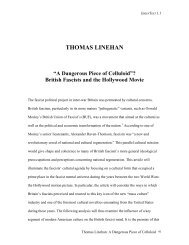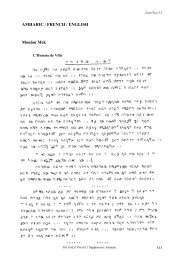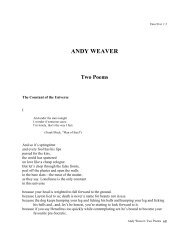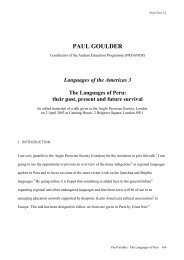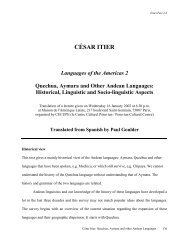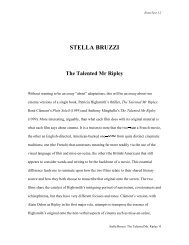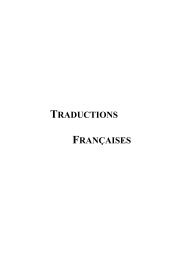Thomas Lamarre: An Introduction to Otaku Movement - Arts @ Brunel
Thomas Lamarre: An Introduction to Otaku Movement - Arts @ Brunel
Thomas Lamarre: An Introduction to Otaku Movement - Arts @ Brunel
Create successful ePaper yourself
Turn your PDF publications into a flip-book with our unique Google optimized e-Paper software.
EnterText 4.1<br />
20<br />
The liner notes <strong>to</strong> the English video release (available on line) do a fine job tracing the references,<br />
imparting a good sense of this information-dense field.<br />
21<br />
Gilles Deleuze, “Postscript on Control Societies,” in Negotiations, trans. Martin Joughin (New York:<br />
Columbia University Press, 1995).<br />
22<br />
Mario Tronti, “The Strategy of Refusal,” in Italy: Au<strong>to</strong>nomia, Post-Political Politics (New York:<br />
Semiotext(e), III.3, 1980, ed. Sylvère Lotringer and Christian Marazzi), 29-30.<br />
23<br />
Kraniauskas, 33<br />
24<br />
I am thinking here of Foucault’s later work, particularly the third volume in his The His<strong>to</strong>ry of Sexuality,<br />
The Care of the Self (New York: Pantheon, 1986), in which Foucault tries <strong>to</strong> determine how the subject<br />
enters in<strong>to</strong> relation with the truth. While Foucault’s work builds directly on the Western tradition (and the<br />
Nietzschean idea that the first episode of the his<strong>to</strong>ry of truth begins with Pla<strong>to</strong>nism), I would like <strong>to</strong><br />
suggest, without pressing the point as an analogy, that such problems also arise in the context of Japan and<br />
China, in the his<strong>to</strong>ry of Neoconfucianism, Buddhism and the relation of the subject <strong>to</strong> self and truth. In this<br />
context, by discussing such a care of the self in the context of cult fans, I do not mean <strong>to</strong> imply some<br />
atavistic continuity between premodern and modern or postmodern subjective formations. Rather, I wish <strong>to</strong><br />
draw out a tension implicit in subject formation as Foucault imagined it, <strong>to</strong> which the later works are<br />
sensitive. One of the best accounts of Foucault’s later work appears in Béatrice Han, Foucault’s Critical<br />
Project: Between the Transcendental and the His<strong>to</strong>rical (Stanford, CA: Stanford University Press, 2002),<br />
which I draw on here.<br />
25<br />
The work (or power) of humour should not be readily debunked, denounced as complicity, or otherwise<br />
given away, however seriously one wishes <strong>to</strong> take it.<br />
26<br />
Theodor Adorno, “On the fetish character in music and the regression of listening,” in J. M. Bernstein,<br />
ed., The Culture Industry: Selected Essays on Mass Culture (London: Routledge, 1991), 40.<br />
27<br />
Matt Hills, Fan Cultures (London: Routledge, 2002), x. Hills rules out intensity and opts for “duration”<br />
as the fac<strong>to</strong>r of greatest importance, but his duration, if given a somewhat Bergsonian twist, is not far from<br />
my sense of the importance of intensity.<br />
28<br />
Slavoj Zizek, “Eastern Europe’s Republics of Gilead” (New Left Review 183, 1990).<br />
29<br />
Okada Toshio, “Nihon ni aisuru beikoku no otaku” (Aera, 2 Oc<strong>to</strong>ber 1995), 43-44. The essay appears on<br />
his website: Otaking Spaceport. <strong>An</strong> English translation (Kevin Leahy) also appears on the web (from The<br />
Rose #47), entitled “<strong>An</strong>ime Culture Is Way Cool! America’s Japanophile <strong>Otaku</strong>.”<br />
30<br />
As Koichi Iwabuchi points out, this process of Japanese identity formation usually excludes or abjects<br />
“Asia,” which is in fact one of the most important markets for anime. See Recentring globalization:<br />
Popular Culture and Japanese Transnationalism (Durham, NC: Duke University Press, 2002).<br />
31<br />
In his recent work, Azuma is adamant that this “superflat Japanese postmodernity” is always already<br />
hybrid. He writes, “any nostalgic return <strong>to</strong>wards its traditional, original, or ‘pure’ Japaneseness seems a<br />
fake,” and “it is the otaku culture that reflects most clearly this mixed, hybrid, bastardized condition; that is,<br />
the paradox that we cannot find any Japaneseness without post-war American pop culture.” See “Superflat<br />
<strong>Thomas</strong> <strong>Lamarre</strong>: <strong>Otaku</strong> <strong>Movement</strong> 186



